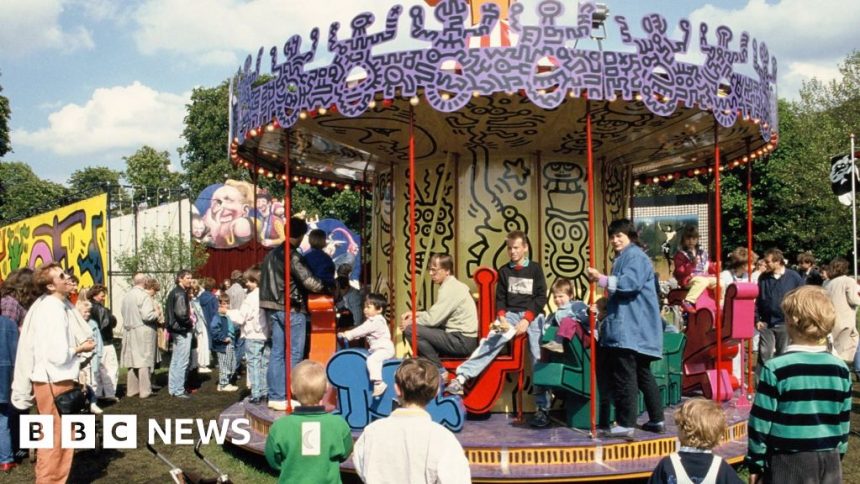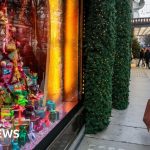44 crates – lost for decades – were unsealed. Inside was a fair dreamed up by art legends
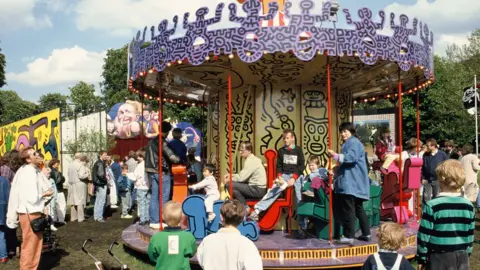 © Keith Haring Foundation/licensed by Artestar, New York. Photo: © Sabina Sarnitz. Courtesy Luna Luna, LLC
© Keith Haring Foundation/licensed by Artestar, New York. Photo: © Sabina Sarnitz. Courtesy Luna Luna, LLCChildren played on fairground rides designed by the world’s greatest artists for a single summer before they disappeared for decades.
The attractions were part of the world’s first art funfair – Luna Luna – dreamed up by little-known Austrian creative André Heller in the 1970s, featuring a carousel by Keith Haring, a Ferris wheel by Jean-Michel Basquiat and a David Hockney pavilion.
Visitors could wander Roy Lichtenstein’s hall of mirrors and marvel at Salvador Dali’s fun dome, sampling biscuits decorated by artist Gertie Frölich as actors dressed as nuns and flamingos milled about.
A successful attraction for months, plans for a grand European tour formed – but when they later fell through, an extensive legal battle ensued and the rides were shut down, disassembled and packed away, forgotten.
Until now.
Luna Luna is unwrapped
American entrepreneur Michael Goldberg stumbled across Luna Luna on an art blog. He’d never heard of it, despite some of the art world’s biggest names contributing. Neither, to his surprise, had his friends in the industry.
“Everyone asked me what I was talking about,” he said. “Something seemed a little odd.”
‘In love’ with the fair, Goldberg wrote to Heller, introducing himself and proposing a new iteration of the Austrian’s original dream.
The two slowly built a rapport and Heller revealed that the attractions had been stored in 44 shipping containers in Austin, Texas since their disassembly.
Opening in 1987, Luna Luna was a colourful success for three months. Its run was extended twice due to high demand, but while trying to fund a European tour, Heller fell into debt and sold the fair to an American foundation.
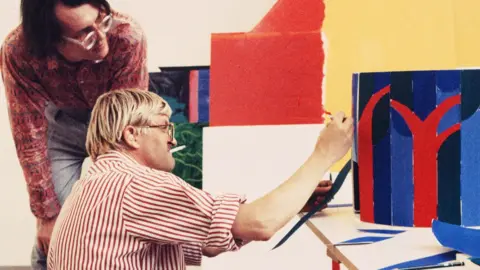 © Sabina Sarnitz. Courtesy Luna Luna, LLC
© Sabina Sarnitz. Courtesy Luna Luna, LLCThe foundation tried to back out of the deal – “buyers remorse”, according to Goldberg – but eventually went through with it. For the duration of the years-long battle and the new ownership, however, the rides were kept in storage.
Decades since Luna Luna was packed away, Goldberg rallied a team of investors to buy what might be left of the exhibition from the foundation – sight unseen.
His key investor? Global rap star Drake, via his investment and entertainment business DreamCrew.
“The idea of restoring something so rich in cultural history outweighed the risks and for us, it wasn’t about guarantees,” Anthony Gonzales, CEO of DreamCrew, told the BBC.
The New York Times estimated they paid $100m (about £80m). The Guardian reported the sum at $1m. Goldberg did not disclose the final price to the BBC.
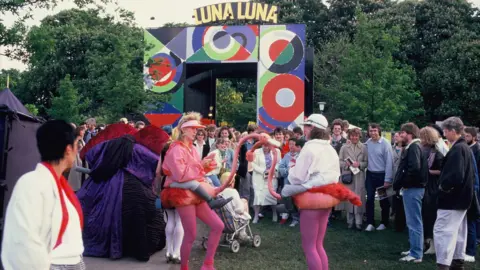 © Sabina Sarnitz. Courtesy Luna Luna, LLC
© Sabina Sarnitz. Courtesy Luna Luna, LLCWhen he opened the first of the containers, Goldberg started to sweat. Luna Luna’s original merchandise had been torn to shreds.
“Did I just lead a group to spend millions of dollars on a pile of dust artwork that essentially rotted away?” he wondered.
It was a sleepless night.
But the next day, as more paper was removed from a second container, the light caught a toffee-apple-red handlebar to Haring’s carousel, then the white floorboards of Basquiat’s Ferris wheel, which “could have been painted days ago”. It was a moment of “instant relief”, said Goldberg.
The return of Luna Luna
Unearthing the artwork wasn’t the hardest part of Luna Luna’s revival.
Brad Gooch, author of recent official Haring biography, Radiant: The Life and Line of Keith Haring, saw Luna Luna being reconstructed, describing the feat as “mind boggling.”
“It was like a giant Lego with no instruction kit,” he said.
A crew of artists, carnival technicians, curators and architects worked together to meticulously rebuild Luna Luna for two years before its grand reopening in LA this March.
Now, Luna Luna: Forgotten Fantasy has come to a Midtown Manhattan art and theatre complex, The Shed. The fair is on display alongside exhibits detailing its surreal curation process.
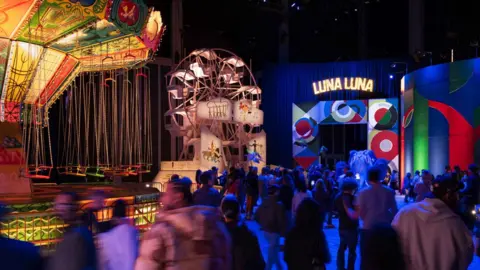 Brian Ferry courtesy of Luna Luna LLC
Brian Ferry courtesy of Luna Luna LLCAlex Poots, creative co-founder of The Shed, described the journey as a “Raiders of the Lost Ark story”, in reference to the film, praising Heller’s ability to commission artists of such high calibre while finding a format appealing to “art lovers and yet to be art lovers.”
“That is a holy grail kind of pursuit,” he added.
Most of the original rides are now housed in a towering 17,000-square foot space. There, exhibition-goers can “marry” one another in Heller’s Wedding Chapel – originally a form of protest art against anti-LGBTQ marriage laws of the 80s.
Hockney’s Enchanted Tree Pavilion still smells faintly sweet, as if stampeding children once crushed fallen popcorn into its floor.
Goldberg’s wish to incorporate “today’s greatest artists” is fulfilled with a soundtrack by modern musicians André 3000, Jamie xx and Jockstrap echoing around the space.
Drake isn’t involved day-to-day but, “he is passionate about Luna Luna and has provided his full support since the beginning,” Gonzales said.
All the fun of the fair?
There’s one big difference between 1987’s Luna Luna and today’s: Children aren’t allowed on the rides.
Basquiat’s Ferris Wheel and Kenny Scharf’s swing ride are display-only. So too (thankfully) is Manfred Deix’s Palace of the Winds in which performers originally farted into microphones.
Haring biographer Gooch doesn’t think the artist would have approved of children just watching his carousel turn.
“I can’t imagine he would allow it,” he said. “He was pretty insistent about interactivity of children with art, and this was art that was specifically made for them.”
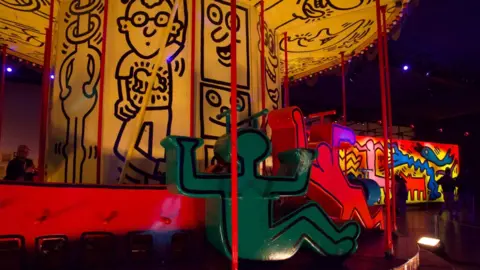 BBC/Ottilie Mitchell
BBC/Ottilie MitchellPoots, who played a significant role in coordinating the interdisciplinary side of the exhibition said of the decision: “They’re priceless works of art now.”
But he champions the possibility of audiences becoming “part of this moving exhibition” through the “carnival-esque environment with performance artists with light, with sound”.
It has been a career-long mission of Poots not “to create these silos for elites”.
He added that ticket prices, criticised by some as being too high, are “pretty reasonable” as the show cost “millions and millions of dollars to install”.
Among the families wandering around The Shed on Thanksgiving weekend were Raemy Suwatson and her 11-year-old daughter, who learned she wouldn’t be able to go on the rides the morning of their visit.
Haring’s carousel was her favourite. “I wanted to ride it” she said, then added “but it was also cool to watch”.
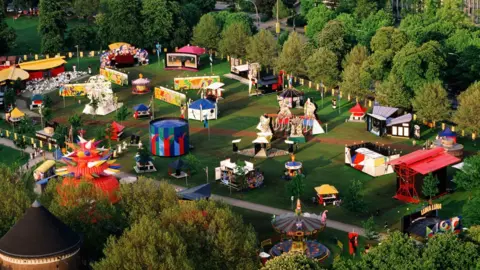 © Sabina Sarnitz. Courtesy Luna Luna LLC
© Sabina Sarnitz. Courtesy Luna Luna LLCThe show is running from 20 November to 23 February, and will tour after it leaves The Shed. Ticket prices range from $44 for an adult to $241 for a Super Moon pass that allows buyers to skip lines. Children’s tickets start at $25.



